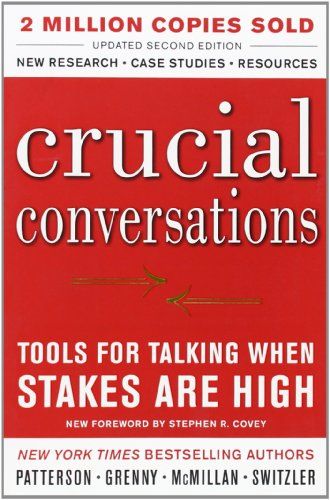Crucial Conversations: Tools for Talking When the Stakes Are High

Pastors have — or should have — a few crucial conversations every week. The challenge: we’re not always equipped for these conversations. In a tense meeting, counseling appointment, or in the dozens of interactions with people every week, we have opportunities to rise to the opportunity, or feel like we’ve blown it.

Crucial Conversations: Tools for Talking When the Stakes Are High is written to help. It defines a crucial conversation as one in which opinions vary, the stakes are high, and emotions run strong. When facing a crucial conversation, we default to one of two responses: silence or violence. We either retreat from the conversation, or go on the attack. “When it matters most,” they write, “we do our worst.”
According to the authors, we can learn a better way. We can learn how to step up to crucial conversations, and handle them well with a set of skills. We don’t have to choose between telling the truth or keeping friends. The skills are simple, and yet challenging.
First, start with the heart by focusing on what you really want from the conversation, and refusing the fools’ choice of silence and violence. Challenge yourself to find a way to express your concerns without offending the other. Begin with yourself, rather than with focusing on the other person.
Second, be alert. Recognize crucial conversations, and watch for signs that people are becoming fearful. Notice your own behavior as well, and understand your default reaction to stress.
Third, make the conversation safe. Once you build safety, you can talk about just about anything. Ensure that you share a mutual purpose and respect; apologize if you’ve violated respect; make it clear what you don’t intend or mean; and create a mutual purpose for the conversation.
Fourth, master your stories. We don’t react to facts. We react to the stories we tell ourselves about the facts. Watch for signs that you are portraying yourself or the other party as victim or villain, or that you see yourself as helpless. Recognize your own role, and assume the best about the other person and their intentions.

Fifth, state your perspective. Share the facts, beginning with the least controversial, most persuasive elements under consideration. Tell your story, and what you’re beginning to conclude. Talk tentatively and ask for their feedback. Make it safe for others to express differing or opposing views as you express yours.
Finally, explore their views. Be genuinely curious and patient. Acknowledge what the other person is feeling; paraphrase their views; draw them out. Agree when you share common ground; build on what they say; compare where you disagree.
Crucial Conversations gives examples and practical advice on each of these steps. It also deals with tough cases in which their advice doesn’t seem to work. At the end of the book, the authors provide a quick summary you can use as you prepare for a crucial conversation.
I’m convinced that this book is a practical application of Jesus’ command to conflict: “So whatever you wish that others would do to you, do also to them, for this is the Law and the Prophets” (Matthew 7:12). It is about respecting others enough to make it safe to talk about difficult things, without retreating to grace without truth or truth without grace. While not a Christian book, Crucial Conversations will help pastors — or anyone else — understand some of the steps necessary to hold difficult conversations in a way that is both honest and gracious.
I can think of many conversations I’ve had that would have been helped by the principles in this book. While no book can get at the heart change required to hold crucial conversations, this book gets at the skills. That makes it a valuable book indeed.
More from Amazon.com | VitalSmarts.com






